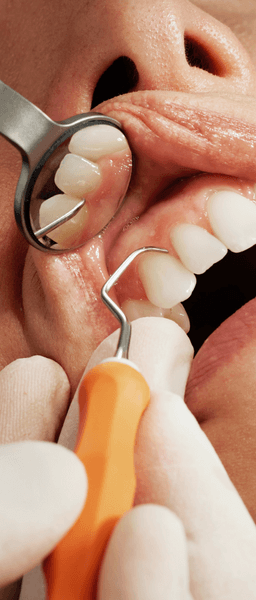
1st February 2020
FAQs On Gum Disease
Gum Disease, also commonly known as gingivitis or periodontal disease, is described as a swelling infection that can cause irritation and soreness to the surrounding gums. Gingivitis and periodontal disease differ as gingivitis is when the gums become red, swollen, and start to bleed when brushed. Periodontal disease is when gingivitis is left untreated after a long period of time and the bone in the jaw that supports the teeth wears away, in turn, causing the tooth to fall out. Here are the answers to some common FAQs on the disease that we get asked at our dental practice in Wolverhampton.
What is the main cause of gum disease?
The top cause of gum disease is the lack of dental care given to your smile. The build-up of plaque is the main culprit. Plaque contains some bacteria that produce toxins that can irritate the gums and cause them to become red, inflamed, and uncomfortable. Brushing and flossing the teeth and gums regularly helps to scrub away any plaque before it has the chance to cling and harden to the teeth.
What else other than bad oral health can contribute to gum disease?

Factors in an individual’s everyday lifestyle such as high-stress levels, diabetes, and even a family record of disease can all contribute to the development of gum disease. Smoking is also another common culprit. The gums become damaged because smoking causes a lack of oxygen in the bloodstream, meaning the gums are unable to heal properly. Smoking can cause excessive amounts of plaque and periodontitis to worsen faster than people who don’t smoke.
How can I prevent gum disease?
Gum disease can be easily prevented with the right amount of care and attention given by yourself and one of our dental professionals in Wolverhampton. Make sure you are brushing twice a day for no less than two minutes. Incorporating flossing into your routine will help to pick away any food or plaque that’s wedged between the hard-to-brush areas of the smile. You can also use an antiseptic mouthwash to help prevent gum disease by targeting unwanted bacteria and flushing them away. Now you know the basics for your at-home care routine, you should also regularly visit your dentist in Wolverhampton to make sure your teeth are maintaining a healthy lifestyle.
Contact Claregate Dental Practice
If you believe you may have some form of gum disease, please feel free to contact our Dentist in Wolverhampton. Our amazing team at Claregate Dental will gladly give you some tips and advice on what you’ll need to do and book you in for a visit with us.






